Using cruise control on the highway helps drivers to maintain a constant speed set by the driver. But does cruise control save gas?
Some experts say that by maintaining a set speed, the automotive feature outperforms the average driver in fuel economy. But others point out that a driver can do better than cruise control when on hilly terrain.
We asked AAA’s Robert Sinclair Jr., “Does cruise control save gas?” and he said he doesn’t believe cruise control is helpful in terms of fuel economy.
“From the outset, cruise control was reputed as a gas saver by maintaining a constant speed and avoiding the gas guzzling on-the-gas, off-the-gas driving style of those in a hurry,” Sinclair said. “Skeptics said ‘not true’ if a lot of hills were involved since maintaining a given speed on a steep incline would use more fuel.”
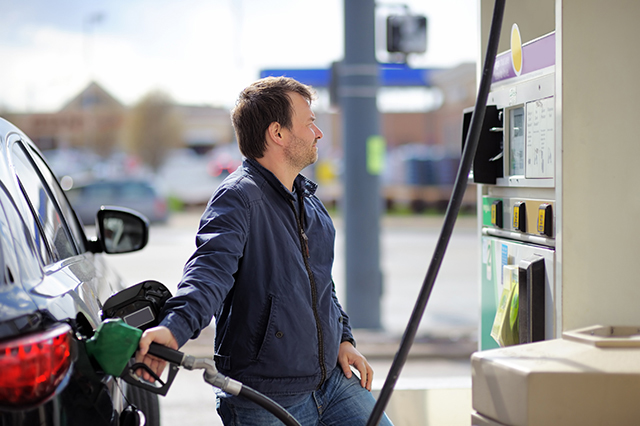
Does Cruise Control Save Gas?
Sinclair said his first experience with the feature was in 1985 following his purchase of a 1982 Mazda 626 with a manual transmission. He too wondered if cruise control saves gas but found it difficult to get an accurate analysis.
“Calculating mileage was hit or miss, relying on the fuel gauge to calculate gallons burned between full and half-full,” Sinclair said. “My mileage always seemed much lower than what the car was supposed to achieve. I noticed that in certain situations, the engine screamed to high [revolutions per minute] to get back to the selected speed. How can that save gas? Also, since cruise control is almost always used on the highway, would it make a difference if used with windows up and air conditioning on or windows down and A/C off? It was difficult to tell.”
Planning a road trip? Want to compare the costs to fly or drive? Visit AAA Gas Prices for a road trip planner gas cost calculator that you can use to find out how much you will spend on gas during your next driving trip or vacation.
Sinclair said that consumers have long complained of vehicles falling short of the amount of money that they were supposed to save on fuel economy due to cruise control.
On a recent drive from Detroit to New York, Sinclair said he once again pondered whether cruise control saves gas.
“The query came to mind as the vehicle I had did all sorts of crazy things while the cruise control was activated as another new system, collision braking, intervened to supposedly prevent crashes,” he said. “The cruise control tracked vehicles in front to slow down if we got too close. It seemed to track cars in an adjacent lane, so when I changed lanes to one with no cars in front for miles, the vehicle inexplicably started breaking hard. It got so bad that I worried I was going to get hit in the back when the wayward system started applying the brakes for no apparent reason. And this saves gas? I switched the system off and drove the way my grandfather learned.”
While some might argue that cruise control improves fuel economy (a 2007 CNN Money report noted that it could save as much as seven percent), Sinclair thought otherwise.
“Having little opportunity to use it and modern systems complicated to the point of frustration, my answer would be a resounding ‘no,’” he said.
How Cruise Control Works
Like a human driver, the cruise control manipulates the speed of the car by adjusting the throttle position, but instead of pushing a pedal, a mechanism called an actuator controls the throttle when cruise control is engaged. Both the cruise control and the accelerator are attached to the throttle with a cable. Both cables move when cruise control is on, which is why you might see your gas pedal move when cruise control is engaged.
The throttle controls the speed by regulating how much air is taken in by the engine. A small computer behind the dashboard or under the hood controls the cruise control. The computer is connected to the throttle controls and other sensors.
And of course most people know this already, but cruise control will automatically disengage when the driver hits the brakes.
Most controls have on and off buttons, as well as accelerate and decelerate buttons, which let you increase or decrease your speed by 1 mph. Some cars also have a coast button, which lets you decelerate while you hold the button down and resume your cruise speed when you release it.
Recently, automakers have also introduced what’s called autonomous cruise control or adaptive cruise control. Not only do these systems maintain a speed set by a driver, they also automatically maintain a safe distance from any vehicles ahead, braking when they get to close and resuming the cruising speed when safe to do so. Does cruise control save gas? Well, some of these features can certainly help.
But cruise control systems can vary in design quality. The true test is when the car ascends a hill. A good system will not deviate the speed of the car too much during an uphill climb and it won’t overshoot the power it needs to maintain the speed necessary, either.
The fuel economy benefits of cruise control come from the system minimizing throttle openings, like when a driver lifts his or her foot off the accelerator a dozen times during a 10 minute drive. Therefore, a cruise control system that struggles on hills is not maximizing its ability to conserve fuel. However, with different systems in different vehicles, you are likely to see different results with almost every car model you drive.
What do you think? Does cruise control save gas in your vehicle when you’re driving? Share your thoughts in the comment section below.
For all things cars, including driver resources, vehicle buying, maintenance and repair and roadside assistance, visit AAA.com/Automotive.
6 Thoughts on “Does Cruise Control Save Gas?”
Leave A Comment
Comments are subject to moderation and may or may not be published at the editor’s discretion. Only comments that are relevant to the article and add value to the Your AAA community will be considered. Comments may be edited for clarity and length.



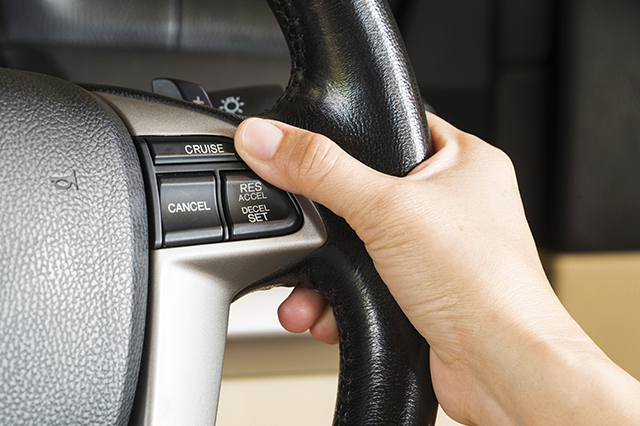
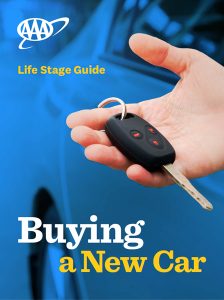


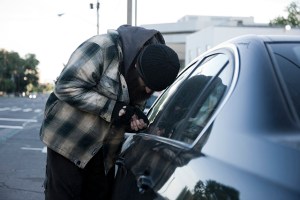




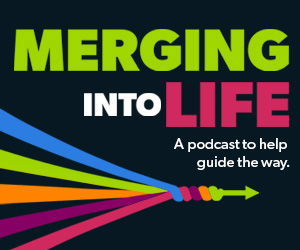



Thank you for the thought provoking conversation. Similar to many complex questions, and as suggested by the responses so far, whether cruise control saves fuel “depends” on many factors. In fact, I believe a combination of cruise control/driver involvement yields the best results and keeps the driver engaged. For example, using cruise control and, if traffic conditions allow, reducing speed as I ascend hills and picking up speed going down hills, all within the speed limit, of course, seems to work best for me, and prevent the downshifts going up or down hill provided by modern cars.
For example, with the cruise set at 65, use the coast button to slow to 60 MPH up hill and accelerate up to 70 down hill. Best case — use the down hill momentum to get up the next hill — follow the example of the truckers.
Even straight up, as long as the car does not accelerate hard, and some do, cruise saves fuel.
The best reason to use cruise control — to eliminate speeding tickets, especially in 30, 40 and 45 MPH zones.
Does it provide better gas mileage, yes and no. If you are on a major four lane highway and the terrain is pretty flat and there is not a lot of traffic, you can get better mileage as the car versus the driver is controlling the speed. I check recently on a 6 hour drive, one way cruise, the other without cruise, the terrain had a lot of hills. What the difference between the trips was less without cruise mostly because I could better control slowing down when traffic backed up as my foot had better control of the speed versus the cruise button, both slowing down and speeding back up. But then I have been driving for a long time, so that may have something to do with it.
Using Cruise Control in my 2013 Honda Accord saves gas. Trips to my house at Cape Cod, 110 miles one way, I had many opportunities to check my mileage with or without Cruise Control. On average I got 42MPG with cruise control, 38-39 MPG without, with speed set at 10MPH above the speed limit.
I believe that cruise control does improve your mileage. having said that, the improvement if any depends upon many factors. In highway driving with light traffic on a long trip ( and maintaining a speed no greater than 65 MPH) the potential gains are surely there. Now add in heavy traffic requiring much breaking for cars in front, not so much. Hills of course also have an effect, but mostly because of cars in front not using cruise control slowing down and forcing you to also slow down or worse speed up to now go around them. In any event, cruise control makes a long trip much less stressful and is well worth using.
I have owned vehicles with and without cruise control, both standard shift and automatic. I currently own a Jeep Patriot with a 5 speed standard transmission.
I like it. Out of high school I owned a 1962 Grand Prix with an automatic transmission. As I was contently under the hood in those days, I installed and after market cruise control system to this GP. I fell in love with this feature after my initial first weekend of trying it out.
I personally feel more comfortable driving long trips, using cruise control. I truly DO believe that it saves fuel. When not using cruise control I found that I would continuously have to adjust my speed (more often to speed up) while driving. With the cruise control on, I am set to the correct speed and not having to monitor my speedometer keeps me more focus on the road ahead. I also find that planning the trip is easier as the time calculation is usually right on even when calculating rest and fuel stops for that trip. I also get my highest MPH figures when using cruise control on open road trips. Using it as recommended by the mfg. is a great feature.
I disagree with the Sinclair’s analogy that cruise control does not reduce fuel consumption. I have a 2008 Camery SLE and Whenever I have long distance drives and use the Cruise Control, I get close to or over 30mph.